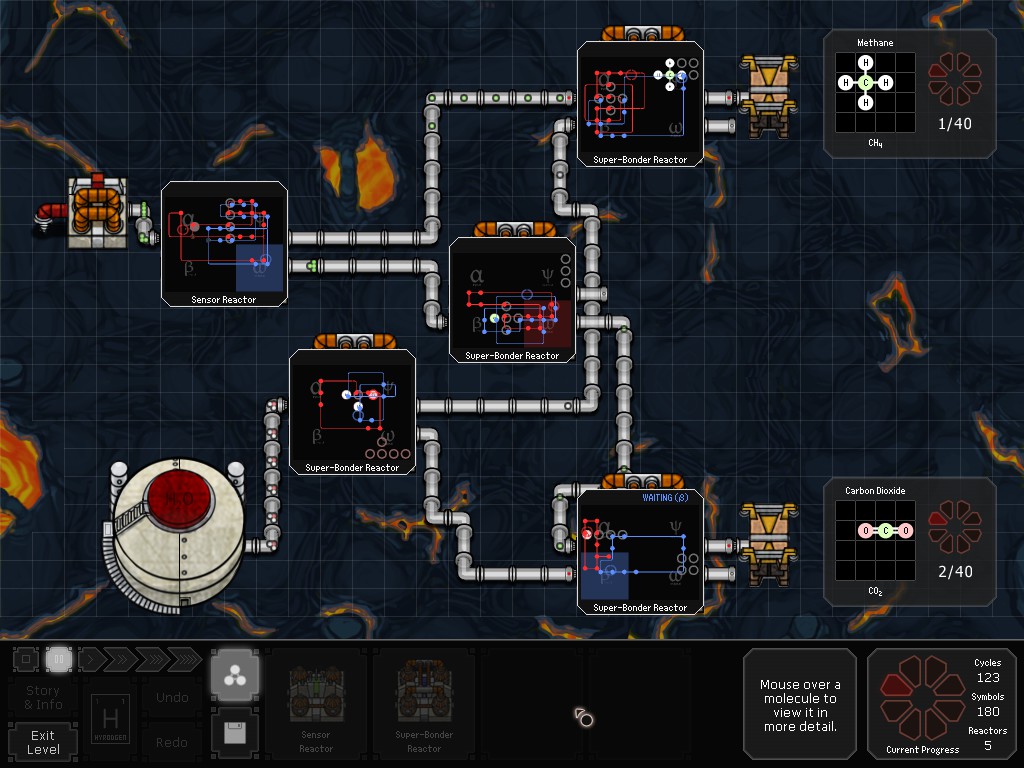SpaceChem is an indie puzzle game which draws its theme from real chemistry in a sci-fi universe, using aspects of programming as the basis for puzzle solutions. A single puzzle is about transforming molecules that come into your reactor on the left into the required molecules that are output on the right. To accomplish this you set up a route with instructions for tiny robots (Waldos) to follow. There's never only one solution - in fact the greatest strength of the game is that you know for any one puzzle you could be designing a solution that the creators never thought of. As such it's much more of a creative game than a typical on-rails puzzle game (like much of Portal 2).
The puzzles start out simple as you get to grips with the basic mechanics of the game or whenever a new instruction is added for you to use. Even these simple puzzles can be really fun as you can try optimize your solutions to achieve the best solutions globally or amongst your friends. You can see an example of this in my earlier post where I tackled Best Left Unanswered (level 8 of more than 50 in the base game) to try and match the best solutions. It's a good example of the game's mechanics and the thought processes that can go into solving a level, so I'm not going to repeat it - just go read it if you're interested.
However, what should be evident from the (cropped) screenshot above is that this isn't a pretty game. The interface is straightforward and functional, but don't expect the production values of a triple-A title. The story, such as it is, is told through (occassionaly funny) pages of text. What you have instead is a game whose prime focus is on challenging you with its excellent puzzles and nothing gets in the way of that.
Which brings me to my only real problem with this excellent game - the different types of levels. They are research, production and defence. Research levels are the simplest: a single reactor with two input areas and two output areas.
Production levels allow you to combine reactors to allow for advanced tasks, and may involve three or more inputs and outputs.
Defence levels are like production levels but always include a gimmick which allows you to turn your chemicals into a way to defeat the monster of the week.
Research levels are tightly focused puzzles which require only one or two bursts of inspiration to figure out and advance. Production levels and defence levels aren't necessarily more difficult than research levels, just bigger and with more opportunities to frustrate. For example, in a production level using 4 reactors you may have spent an hour building the first 3 reactors only to realize while building the 4th reactor that your solution can't possibly work and you'll have to start again from scratch. These kind of levels feel more like a chore after following the fun research levels. There are few optional levels which means you will have to complete these kinds of levels to advance. (I've only seen research levels in the free DLC so far, so maybe the developers have realized where the strength of their game is.)
However, these concerns are minor. If you have any interest in puzzle games, you owe it to yourself to at least try the demo (available on Zachtronichs Industries game purchase page).
Final Score: 8 / 10 - Superb puzzles from easy to really challenging, and new puzzles are continuously being added for free. If it's puzzles you want, you won't be let down (just don't expect anything else - like story, music or pretty graphics).
Notes on my personal rating scale: They are entirely based on my personal feelings about the game - I don't rate a game on its own merits but rather how much I've enjoyed and how much time it's sucking out of my life. Strategy games will do well and shooters poorly because those are my gaming preferences.
0-4 = Poor game that I won't be bothering to play any more
5-7 = Decent game - fun enough that I'll try play it some more if I have the time
8-10 = Good game that I'll be playing a lot more or have already finished and greatly enjoyed




No comments:
Post a Comment